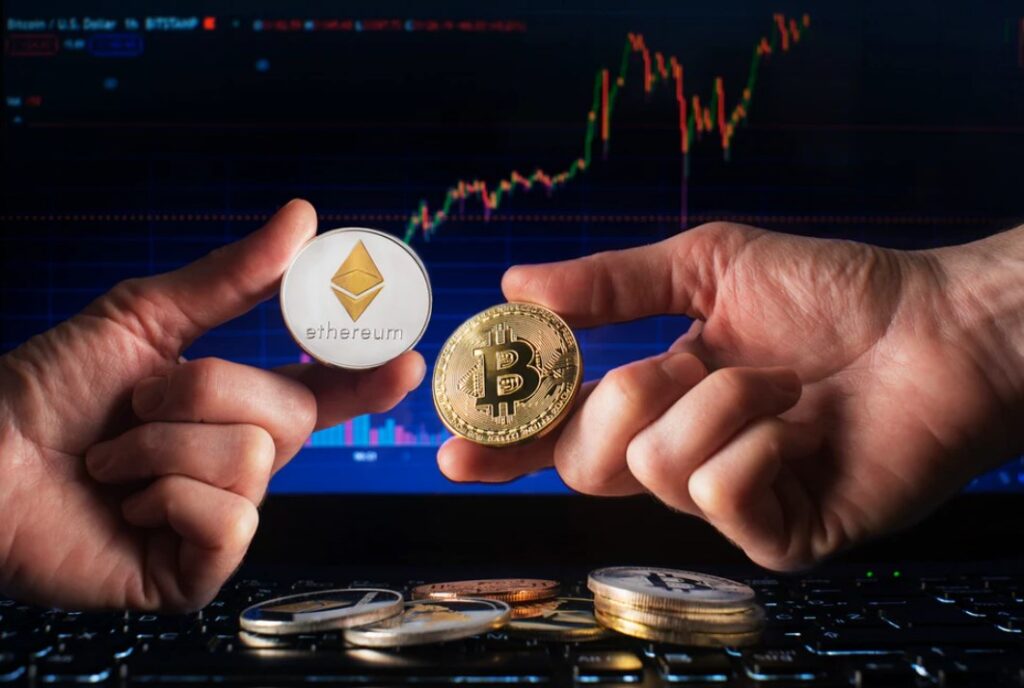For anyone new to the cryptocurrency world, Bitcoin and other cryptos might mean the same. If you are one of those people who think that the technology between all the digital currencies is the same, then you are very wrong. This line of thought definitely applies to Bitcoin and Ethereum. With numerous crucial differences, Bitcoin and Ethereum are the leaders of the virtual currency market.
At first glance, one will be able to see a lot of similar things between both cryptocurrencies. But, as you gain your footing in the market, you will know how these cryptos’ functions are widely varied. First, let us start with the basics.
1. Covering the Basics – Getting to Know Bitcoin and Ethereum
Cryptocurrencies are virtual currencies that involve a lot of mathematics, cryptography, and coding. These currencies are a newly emerging asset class that is backed up by decentralized blockchain technology. They can be stored, traded, bought, and sold via crypto exchanges. Now, sharing fundamentals, Bitcoin and Ether are both cryptocurrencies that have stirred up a storm in the digital world
Bitcoin – What’s the Fuss?

Source: cnbc.com
One might wonder why Bitcoin’s reputation is so high and everyone is obsessed with it. One of the main reasons for it is that it was the first-ever successful digital currency that came into existence. An online currency, one that is not regulated by any central authority, will surely demand the attention of people from all walks of life.
Even though Bitcoin isn’t widely accepted as a form of payment, this peer-to-peer network has been the pioneer in the field of virtual currencies. Functioning with the assistance of blockchain technology, encryption and distribution have acted as the two defining traits of this cryptocurrency. One can go URL and find more about this topic.
Ethereum – The Perfect Alternative

Source: itnetwork.rs
While Bitcoin is a digital currency, Ethereum is a software platform created with the help of blockchain technology. Launched in 2015, Ethereum is the largest open-ended decentralized software platform that deals with dapps and smart contracts. This feature enables Ethereum from being interfered with by any third-party users. The platform has its own programming language, thus allowing developers to build and test out their applications.
Ether is the virtual currency fuelled by this platform. On the platform, it also plays a vital role in building and running applications. Ethereum aims to establish Ether as a token of payment that can be stored, traded, or a currency that can be utilized as collateral. By market cap, Ether stands next to Bitcoin.
2. Understanding Their Goals

Source: bustle.com
To explore this difference between the two largest digital currencies further, one has to acknowledge and understand why these currencies were created in the first place. Click on crypto-genisus.com/pt/login to learn more.
Replacement for Centralized Currencies
Bitcoin’s purpose when it was launched was this – to serve as an alternative for the traditional currencies, thus enabling people from across the world to trade with one common currency without any third-party interference. Currently, Bitcoin aims to establish itself as a mode of payment and as a store of value, thus sealing a solid foundation for the future use of the said virtual currency.
Exploring Further Uses of Blockchain Technology
The story of Ethereum is altogether different. The founders of Ethereum saw the potential of blockchain technology and took this to the next level. A decentralized platform was created, where developers can construct their codes and build applications, and Smart Contracts. While Bitcoin aims to prove as a replacement for the traditional fiat currencies, Ether was created to be the backbone of the platform Ethereum.
Ether is the token used to build dapps and smart contracts on Ethereum but it also serves as a digital currency that can be stored, traded, etc. It is a one-stop entity that runs the applications on the platform while simultaneously functioning as a virtual currency.
3. Familiarizing with Technologies and Protocols

Source: techcavit.com
Before delving deeper into this subject, one needs to know that the protocols under which Bitcoin and Ethereum operate are not the same. We’ll take a quick look at the technology that backs up these currencies.
Blockchain Technology and Cryptography Techniques
The transactions on both the Bitcoin and Ethereum systems are stored in a distributed ledger, and this ledger is known as a blockchain. Blockchain, to put it simply, is a string of blocks of information that are arranged periodically. These blocks could be of any kind of contract between two parties, this is the name peer-to-peer.
Cryptocurrencies are generated by a process called mining. In simple terms, mining is the process in which complex cryptographic equations are solved with the help of computers. When solved, a block of data is created and gets added to the blockchain. For solving an equation, the miner is rewarded with some amount of digital currencies. Ethereum is different from Bitcoin on the basis that the mining can be done on the network itself.
4. Comprehending Block Time Differences

Source: admiralmarkets.com
One of the most noted differences between Ethereum and Bitcoin is the variation in Block Time. While the average time for a miner to solve an equation in the Bitcoin system is calculated to be around 10 minutes, the operation just takes around 17 seconds on the Ethereum platform. The reason behind the extended time it takes with Bitcoin is because it wants only one miner for a block, which is almost impossible.
Ethereum overcomes this problem effortlessly. When there is a block mined by several miners, it is named the Uncle Blocks and each miner is given a certain percentage of the digital currency that one gets with mining. Still, miners need to be quick in their work if they want to be a part of an Uncle Block, as not many miners are rewarded with incentives and there aren’t many Uncle Blocks being produced.
The Bottom Line
The basic difference between Bitcoin and Ethereum is this – Bitcoin just aims to serve as a currency while Ethereum is a platform with many futuristic goals, including providing a space for those who wish to create and run decentralized applications. Before jumping into the world of virtual currencies and making any investments, make sure to do your research and if possible, consult with a financial advisor too.



